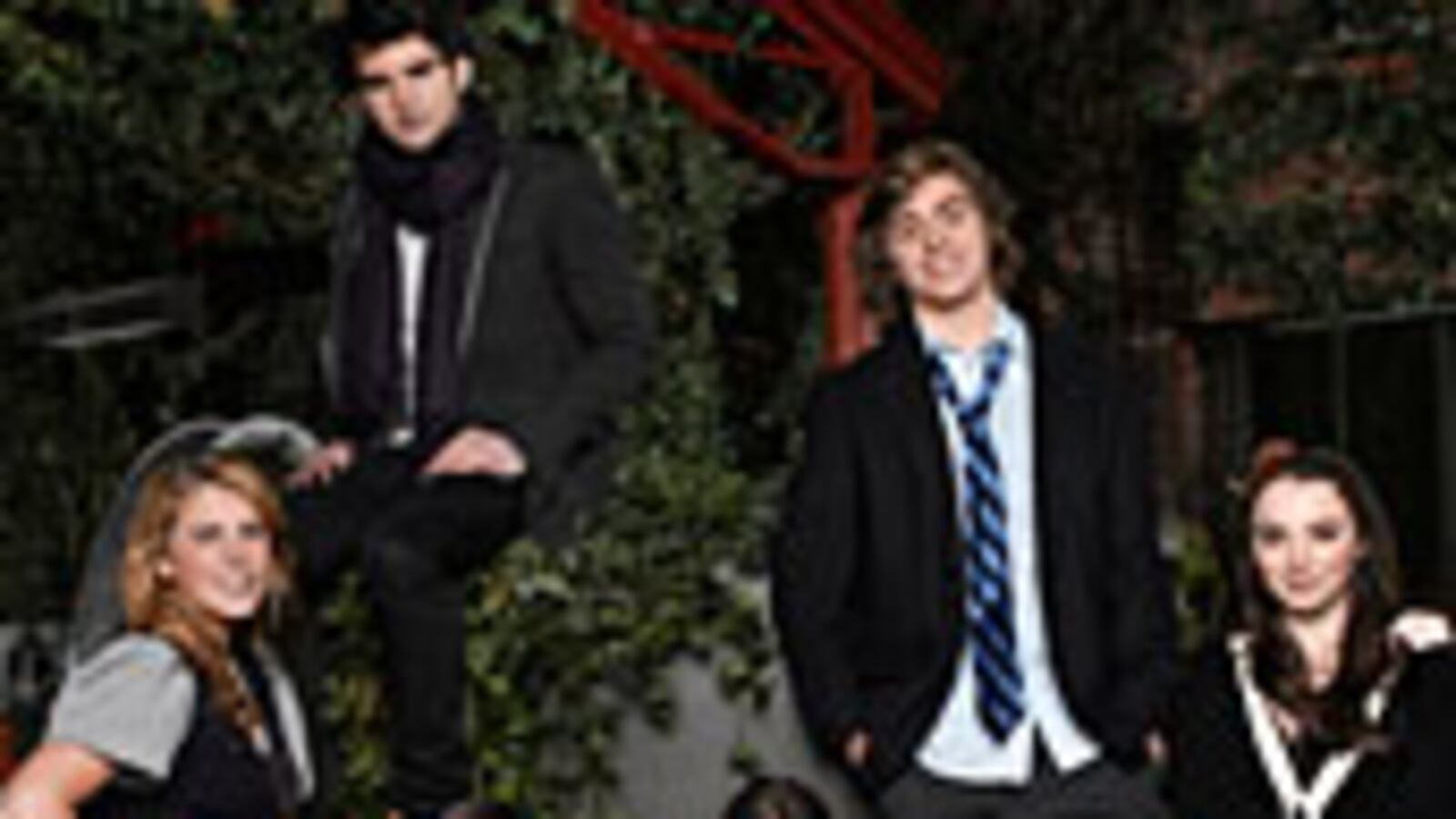
It had to happen: a reality show based on a fiction based on reality. Bravo’s NYC Prep (premiering tonight at 10 p.m.) so slavishly echoes Gossip Girl—which is already based on the phenomenon of superindulged, precociously sophisticated, Champagne-swilling Upper East Side prep-school kids—that watching the new show is like being lost in a hall of mirrors. Has Gossip Girl simply broadcast the students’ types to the world? Or has the drama so influenced the culture that the six people on NYC Prep are now taking cues from its imaginary world? We’ll never sort that out.
We do know that reality shows have always been quasi-fake constructs, the situations manipulated, the scenes edited, the characters shaped as if they were made of Silly Putty. NYC Prep carries that artifice to such an extreme that when these kids drink, hook up, obsess about college, and read gossip about themselves on their BlackBerries, they seem like avatars instead of actual people.
The most dynamic character is PC, a handsome, callous, megarich playboy at 18, blithely spouting what might be the show’s words to live by: “Everything in New York is about money and power.” Chuck Bass— Gossip Girl’s titan of industry while still in high school—could sue for copyright infringement.
NYC Prep carries artifice to such an extreme that when these kids drink, obsess about college, and read gossip about themselves on their BlackBerries, they seem like avatars instead of actual people.
Kelli lives in Manhattan with her brother while her parents remain in the Hamptons ( Gossip Girl’s Nate had a similar stretch of being home alone). There’s boyish, womanizing Sebastian (definitely Nate) and more generically Camille, the wholesome looking overachiever who matter-of-factly sets out her life plan: “First, I will go to Harvard.” There’s even a public-school student, wide-eyed Taylor, who is friendly with this rich crowd but knows she doesn’t quite fit in, just like little Jenny from Brooklyn on Gossip Girl. If there is no exact echo of swanning Serena or scheming Blair, it’s because even in their fictional world they live on an Olympian mountain of impossible beauty and privilege.
NYC Prep’s biggest howler arrives when PC’s best friend and former girlfriend, Jessie, is told by a dress shop assistant that she might have stepped out of Gossip Girl. “I hate that show,” Jessie snarls, protesting way too much that the series’ popularity has diluted her elite life with an influx of wannabes, and clutters up her neighborhood with trailers when it films there. But petulant, cranky Jessie (at least as she’s been edited), still carrying a bit of baby fat, is the least Gossip Girl-y of all. Maybe that’s why she seems secretly pleased when the salesperson says, “You guys are the real Gossip Girl.”
Of course, almost all the kids on that fictional show are actors in their 20s, and look it. The fun of watching reality series is the voyeuristic thrill that comes from knowing these people really exist. Bravo coyly doesn’t include last names or mention any schools (none of the schools allowed filming on campus), but reality shows aren’t confined to what we see on screen anymore. They are also shaped by whatever outside knowledge viewers carry along, and the most naïve high-school student could have predicted that the Internet and press would be flooded with details that fill out the avatars’ profiles.
In this dire economy, the show’s spoiled-rich world looks more alien than ever, not a scene to aspire to, but one that makes you wonder how badly the kids’ trust funds have been hit.
Such mainstream sites as The Wall Street Journal online and tabloids like the New York Post tell us that Camille actually goes to Nightingale-Bamford, supposedly the inspiration for a Gossip Girl school, and that Jessie and PC go to Dwight. It’s easy to learn that PC’s full name is Peter Peterson, and that he’s the namesake grandson of the billionaire businessman Peter G. Peterson (he really is a Chuck). Taylor’s public school is smart but public Stuyvesant.
One night these frenemies have dinner and talk about virginity; one day PC laughs at Jessie because she’s planning a benefit for Operation Smile, a charity that helps children with cleft palates; on another day he calls her a bitch and she slaps his face. It’s all pretty entertaining. But real? Come on, they are surrounded by cameras, which they’re not always too drunk to forget. They’re posing.
They’re no more theatrical than any reality-show celeb, though, as the line between reality and fantasy gets blurrier and blurrier. Bravo’s hit Real Housewives of New Jersey, the latest in the buzzed-about franchise that long ago left Desperate Housewives in the zeitgeist dust, recently ended its season with a raucous family feud in which petite Teresa flipped over a table in a restaurant (and she’s one of the nicer characters). Two nights later, Bravo showed—honestly, they called it this—the extended “director’s cut” of the restaurant blow-up. Could this television-ready battle possibly have been less orchestrated than some fight on an old Jerry Springer or the WWE?
Heidi Montag and Spencer Pratt, once garden-variety reality-show players on The Hills, have lately morphed into cartoon versions of themselves. They appeared briefly on NBC’s dismally rated I’m a Celebrity... Get Me Out of Here, and later went on a televised grievance tour, complaining about the show on Today and then complaining about Today on Larry King and MTV News, where Heidi suggested Al Roker was possessed by the devil. And now, they’re heading back to the jungle of Celebrity for more.
Audiences are savvy about this today, even as we continue to be amused by people self-consciously acting out versions of themselves for the cameras. And there is another, unexpected reason a series like NYC Prep seems more fictive than genuine. In this dire economy, the show’s spoiled-rich world looks more alien than ever, not a scene to aspire to, but one that makes you wonder how badly the kids’ trust funds have been hit. So far no one has complained about belt-tightening. The producers and editors are handing us people who live in a gauzy fantasy. We can only wonder if even they know what parts of their characters are genuine.
Caryn James is a cultural critic for The Daily Beast. She also contributes to Marie Claire and The New York Times Book Review. She was a film critic, chief television critic and critic-at-large for The New York Times, and an editor at the Times Book Review. She is the author of the novels Glorie and What Caroline Knew .






